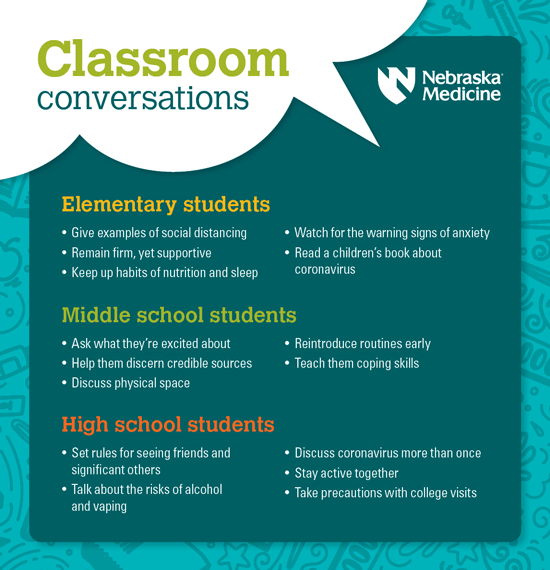From elementary to high school students, here are concrete ways to help your kids transition to the school year during the COVID-19 pandemic. Two experienced child mental health professionals offer advice on everything from social situations to healthy habits.

For more practical tips, here's your COVID-19 back to school safety guide. Get expert guidance on school physicals, whether it's safe for kids to wear masks and how to choose extracurricular activities.
Elementary students
Give examples of social distancing
"The younger the child, the less aware they are of what 6 feet actually means. Give them some tangible examples of what social distancing looks like. Give them some common scenarios: how to space out in the classroom, the cafeteria and at recess," says psychiatrist and educator Howard Liu, MD, MBA.
Remain firm, yet supportive
How to handle different scenarios:
- Handling upsets: If your child protests or cries during drop-off, remain firm, yet supportive
- Problem-solve specific issues: I can see that school is making you feel scared, but you still have to go. Tell me what you're worried about and let's talk about it
- Reward "brave" behavior: I know you were really worried about school this morning and I am so proud of you for being brave today
Keep up habits of nutrition and sleep
Healthy habits are important. Child psychologist, Katrina Cordts, PhD, says, "For younger kids, it is important to not forget the basics. No one copes well when they are overly tired or hungry. Make sure they have nutritious meals and snacks and enough sleep."
Watch for the warning signs of anxiety
Watch for these signs that your younger child needs additional help. Dr. Cordts says, "The biggest thing to be on the lookout for is a change in the child's normal behavior." These problems can usually be addressed quickly with early intervention.
Signs your child may need help coping:
- Not eating or sleeping well
- No longer interested in things they once enjoyed
- Withdrawing from friends or activities
- Going back in their behavior (like sucking their thumb or wetting the bed)
Read a children's book about coronavirus
Need a kid-friendly way to talk about COVID-19? Download a free children's book about coronavirus, written by Nebraska Medicine pediatrician Samantha Rohe, MD.
Middle school students
Ask them what they're excited about
Dr. Cordts says, "While it is certainly important to acknowledge the things that may be different this school year, it's also helpful to encourage your children to identify the things they are looking forward to." These questions redirect their attention away from their worries while also focusing on the exciting and fun aspects of school. Ask your child questions like, "What are the three things you're most excited about?"
Help them discern credible sources
Media consumption is another opportunity for guidance. Middle schoolers often seek information from social media (like a favorite YouTube channel) instead of newspapers or publications. You can help them discern which sources are accurate and informative versus those meant for entertainment. Show them credible sources, like this comic book Ask a Scientist: How Do People Become Infected with Germs? published by the CDC.
Discuss physical space
Remind your children the importance of keeping physical space between them and others – especially friends and significant others. It's always important to chat with kids in an age-appropriate way to reinforce the value of social distancing. Kids naturally draw closer together when they reunite with their friends.
Reintroduce routines early
Dr. Cordts says, "Routines are great! Start practicing (or re-implementing) routines several weeks before school starts." Getting your children back on a regular schedule will help alleviate some of the normal back to school worries, especially if they've been without a routine for several months.
Teach them coping skills
If your children are stressed out, you can teach them coping skills. "Anxiety is very treatable," says Dr. Liu. "Older kids can use coping methods like deep breathing, guided imagery and progressive muscle relaxation. They can also identify negative thoughts and ask themselves the evidence for those thoughts." So if a child is worried that they'll get sick, you can show them all the ways you're keeping them safe. And if they still struggle, don't hesitate to refer them to a child therapist.
High school students
Set rules for seeing friends and significant others
"Talk to your teenagers about relationship boundaries," says Dr. Liu. "There are risk factors for interacting with other teens. If you don't set up explicit rules, you're going to be asked every day about hanging out with friends. The same thing goes for romantic relationships. Be upfront on what's known and unknown."
Talk about the risks of alcohol and vaping
"Sharing alcohol or vaping with friends increases risk factors," says Dr. Liu. "People do not socially distance well under the influence. Try to address these topics upfront."
Discuss coronavirus more than once
Dr. Liu serves as the chair of the UNMC Department of Psychiatry. He says, "You can't just have one talk about coronavirus. It's like the sex talk – discuss it more than once." Unscheduled times to talk work great, like when you're picking them up from school or having a family meal.
Stay active together
"Find alternatives to stay active if organized sports are cancelled. We do family bike rides together – it's okay if your teenager or tween rolls their eyes. You can also take a walk together," he says.
Take precautions with college visits
And finally, college visits have changed. "Initially, a lot of college visits were cancelled," says Dr. Liu. "Some colleges are cautiously opening up again with modifications or scheduling virtual visits. If you plan to visit a campus in person, take precautions."


